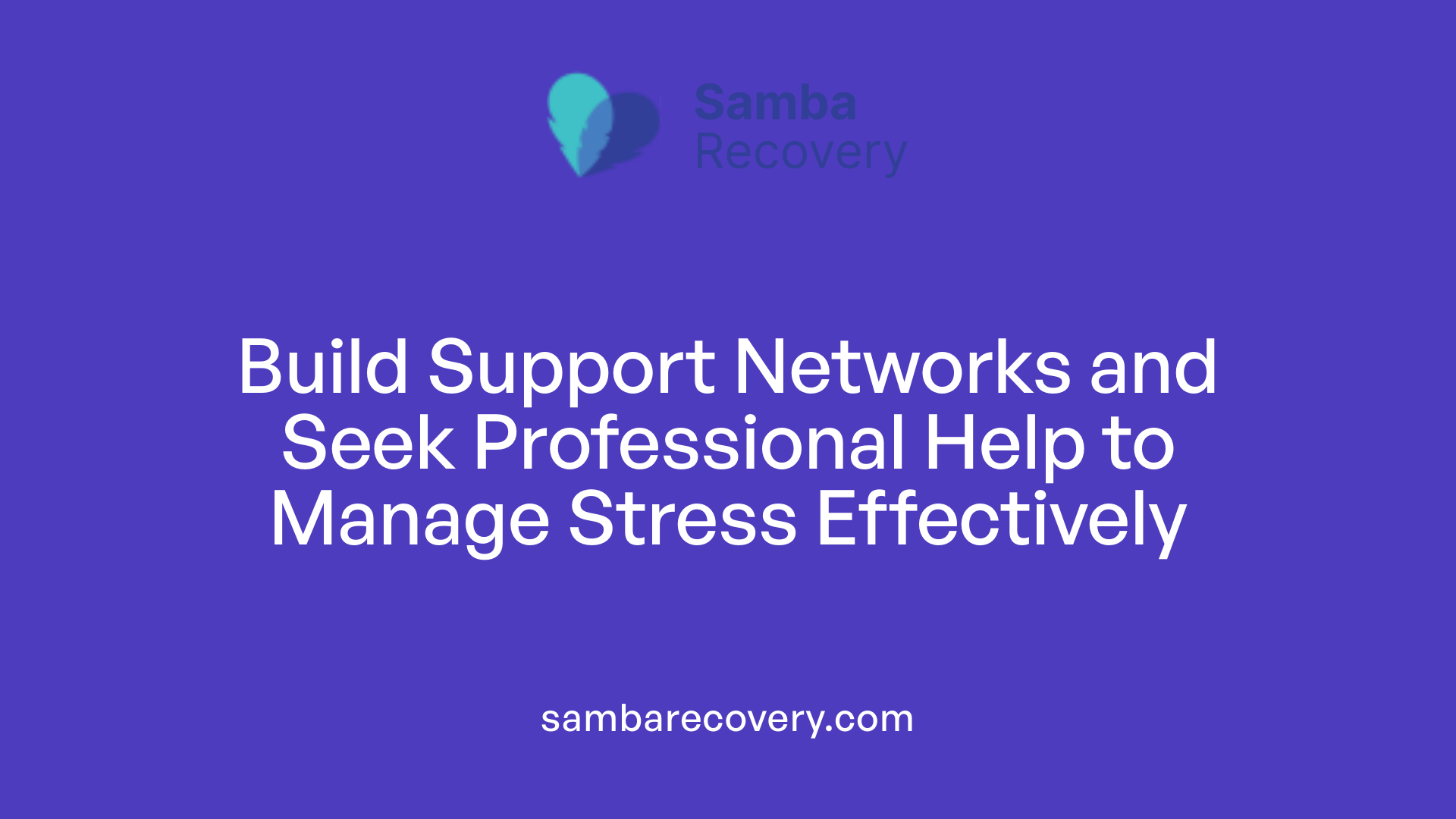How to Manage Stress Without Relying on Substances
April 25, 2025
Empowering Ways to Alleviate Stress Naturally

Understanding Stress and Its Impact on Well-Being
Stress is your body's natural response to demanding situations, but chronic stress can lead to serious health issues such as cardiovascular disease, mental health disorders, and a weakened immune system. Recognizing and managing stress effectively without resorting to substances like alcohol or drugs not only promotes mental clarity but also enhances physical health. This article explores comprehensive strategies rooted in trustworthy sources to help you navigate stress healthily and sustainably.
Grounding Techniques and Mindfulness for Instant Calm

How can I relieve stress without doing anything?
When feeling overwhelmed, sometimes the best approach is to pause and practice simple grounding and mindfulness techniques. One effective method is the 5,4,3,2,1 technique, where you focus on your senses one by one—identifying five things you see, four you touch, three you hear, two you smell, and one you taste. This exercise helps anchor your mind in the present, reducing feelings of anxiety or panic.
Brief meditation sessions, even lasting just a minute, can significantly calm your nervous system. Focusing on your breath— noticing each inhalation and exhalation—gently quiets racing thoughts. Guided meditations available through apps can provide structure for these short sessions.
Expressing feelings through journaling is another subtle way to manage stress silently. Writing down what you're experiencing allows you to process emotions and gain perspective. Practicing gratitude by jotting down things you're thankful for shifts your focus away from stressors towards positive aspects of your life.
Listening to calming music, humorous videos, or virtual tours can serve as mental escapes, providing temporary relief and boosting your mood. Maintaining social contact via a phone call with a loved one can also offer emotional support, helping to lessen feelings of isolation and stress.
These methods require no physical exertion and can be practiced anywhere, making them perfect for instant calm when right now is all you've got.
Why is it important to seek mental health support when managing stress?
Managing stress effectively often involves understanding and addressing underlying causes, which isn't always easy to do alone. If feelings of stress or anxiety last for two weeks or more, worsen, or interfere with daily activities—such as sleeping, eating, or working—it’s crucial to seek professional mental health support.
Mental health professionals can offer tailored guidance and teach healthy coping strategies like cognitive-behavioral techniques or mindfulness practices. They can help identify potential underlying conditions like depression or anxiety that exacerbate stress. Early intervention not only prevents the escalation of emotional difficulties but also reduces the risk of physical health problems such as high blood pressure or weakened immunity.
Furthermore, therapy can strengthen social skills and help build a support network, which is essential for resilience. Support from mental health experts provides a safe space to explore feelings and develop sustainable strategies, improving overall mental well-being.
In addition, these professionals can assist in managing the psychological impacts of chronic stress, trauma, or stressful life events like grief or job loss, ensuring that recovery and adjustment happen in a healthy, supportive environment. Overall, seeking help is a proactive step towards maintaining both mental and physical health, allowing you to cope better with life's inevitable stresses.
The Neuroscience of Stress and Addiction

What is the connection between stress and substance abuse?
There is a strong link between stress and substance abuse: high stress levels can lead individuals to use drugs or alcohol as a temporary coping mechanism.
Stress activates complex neurobiological pathways involving corticotropin releasing factor (CRF), the hypothalamic-pituitary-adrenal (HPA) axis, and the autonomic nervous system. These systems coordinate our body’s response to demanding situations by releasing stress hormones like cortisol and adrenaline, preparing us to confront challenges.
However, persistent or chronic stress can cause adaptations in these pathways, affecting key brain regions like the amygdala, basal ganglia, and prefrontal cortex. These areas are essential for emotion regulation, decision-making, and impulse control.
When these systems are altered by ongoing stress or early adversity, they can disrupt normal neurotransmitter functions—particularly dopamine, serotonin, GABA, and norepinephrine. These chemicals are critical for feelings of pleasure, reward, and emotional stability.
As a result, individuals may seek relief or rewards through substance use. Drugs and alcohol temporarily activate these reward pathways, reducing negative feelings but also reinforcing dependency.
This cycle of stress, neurochemical disruptions, and substance seeking can create and worsen mental health problems, increase cravings, and make recovery more complicated, forming a feedback loop that sustains addiction.
How does drug abuse influence brain function and emotional regulation?
Drug abuse significantly impacts brain function, especially the neural systems responsible for emotion regulation and motivation.
Substances like opioids, alcohol, and stimulants alter neurotransmitter activity, with dopamine playing a central role. Dopamine is involved in experiencing pleasure and motivation; drugs flood the brain with dopamine, creating intense feelings of euphoria.
Over time, this overstimulation impairs the normal functioning of the brain's reward system. The amygdala, which processes emotions, becomes overly reactive, making it difficult to regulate feelings or respond appropriately to stress.
Meanwhile, the basal ganglia and prefrontal cortex—areas involved in planning, decision-making, and impulse control—are affected by prolonged substance use.
These neurochemical changes diminish the brain’s ability to experience natural rewards and can lead to increased impulsivity and poor decision-making.
This neuroadaptation contributes to emotional instability and reduces resilience to stress, making relapse more likely whenever stress levels rise.
In essence, drug abuse hijacks the brain's natural chemistry, impairing emotional regulation and fostering behaviors that reinforce addiction. Addressing these neurological disruptions is essential for effective treatment, helping individuals rebuild healthy brain pathways and emotional resilience.
Healthy Lifestyle Modifications to Reduce Stress

How can lifestyle modifications help in managing stress?
Incorporating healthy lifestyle changes plays a crucial role in managing and reducing stress. Regular physical activity, such as brisk walking, aerobic exercises, yoga, or sports, triggers the release of endorphins, the body's natural mood elevators. These activities not only decrease muscle tension but also improve overall mental health by elevating mood and fostering a sense of well-being.
Maintaining a nutritious diet is equally important. Consuming a balanced meal rich in fruits, vegetables, whole grains, omega-3 fatty acids, magnesium, and probiotics helps stabilize mood and energy levels. Limiting processed foods, high-sugar products, caffeine, and alcohol reduces stress triggers and promotes better mental clarity.
Sleep quality significantly impacts stress levels. Establishing a consistent sleep routine, avoiding stimulants before bedtime, and practicing relaxation techniques like deep breathing or meditation before sleep enhance emotional resilience. Creating a calming bedtime environment further improves restorative sleep.
Fostering social connections, setting healthy boundaries, and balancing work and leisure activities are essential for mental health. Supported by relaxation practices like mindfulness, meditation, and engaging in hobbies, these habits form a comprehensive approach to tackling stress.
What specific lifestyle habits can reduce stress hormones?
Certain daily habits effectively decrease the body’s stress hormones, particularly cortisol. Engaging in cardiovascular exercises such as running, biking, swimming, or brisk walking promotes the release of endorphins, which naturally elevate mood and counteract stress responses.
Reducing the intake of caffeine and alcohol helps keep cortisol and adrenaline levels balanced. Excessive consumption of these can elevate stress hormones and disrupt sleep patterns.
Practicing mindfulness meditation and deep breathing exercises decreases activity in the sympathetic nervous system, activating the parasympathetic response that promotes relaxation.
Eating foods rich in omega-3 fatty acids, magnesium, and antioxidants supports brain health and dampens inflammatory responses related to stress. Spending time in nature, such as gardening or walking in parks, offers restorative effects that further lower stress hormones.
Finally, ensuring adequate sleep—aiming for 7-9 hours per night—helps regulate cortisol, strengthens immune functioning, and enhances mood stability.
Additional strategies for stress reduction
In addition to lifestyle habits, engaging in hobbies, socializing, and practicing gratitude can significantly lower stress levels. Regular breaks during the workday, planning vacations, and staying connected with loved ones provide emotional relief.
Adopting these sustainable lifestyle practices not only manages stress effectively but also improves overall physical and mental health, creating resilience against daily stressors and life's challenges.
Recognizing and Responding to Signs of Excessive Stress
What are the signs of stress that should prompt seeking support?
Stress manifests in various ways across physical, emotional, and behavioral domains. Recognizing these signs early can be critical in seeking appropriate support and preventing escalation into more serious health issues.
Physical signs
Stress often impacts the body first, with symptoms that may include persistent headaches, muscle tension or soreness, and chest pains. Sleep disturbances such as insomnia or nightmares, changes in appetite—either increased or decreased—and fatigue are common physical indicators. Stomach issues like nausea, diarrhea, or constipation can also arise, along with increased heart rate and gastrointestinal discomfort.
Behavioral signs
Changes in behavior may be subtle or more apparent. These include withdrawing from social activities, neglecting responsibilities at work or home, and difficulty concentrating or making decisions. Individuals experiencing high levels of stress might turn to increased alcohol consumption or drug use as a coping mechanism. Mood swings, irritability, or increased agitation are also behavioral signals. In extreme cases, an individual may experience panic attacks, exhibit signs of self-harm, or show signs of losing contact with reality, such as hallucinations or paranoia.
Mental and emotional signs
Emotionally, stress can cause feelings of anxiety, sadness, or anger that persist beyond usual experiences. People may feel overwhelmed, hopeless, or helpless. Anxiety and irritability are common, with some individuals reporting a sense of constant worry or fear. Difficulties in focusing, memory problems, or a decreased ability to enjoy activities they once found pleasurable are also concern signs.
When should you seek help?
If you notice persistent symptoms across any of these areas—such as ongoing anxiety, mood changes, physical discomfort, or behavioral shifts—it's time to seek support. Immediate help is even more necessary if symptoms include suicidal thoughts, self-harm behaviors, panic attacks, or any indication of a loss of contact with reality. Recognizing these signs early can make a significant difference in managing stress effectively and preventing more serious health consequences.
How support can help
Getting support might involve talking to trusted friends or family members, consulting mental health professionals, or reaching out to helplines like SAMHSA’s National Helpline. This service offers free, confidential assistance 24/7 and connects individuals to local treatment facilities, support groups, and community programs.
Addressing stress early through counseling, lifestyle adjustments, or medical intervention can improve overall well-being, restore emotional balance, and reduce the risk of developing chronic health issues or substance abuse problems. Remember, acknowledging and acting on these signs is a vital step toward health and resilience.
Self-Medication Risks and healthier Alternatives

What are the risks of using substances as a way to cope with stress?
Self-medicating with alcohol, drugs, or other substances to handle stress might seem like a quick fix, but it carries substantial dangers. Relying on these substances for emotional relief can quickly lead to dependence and substance use disorder (SUD), a chronic condition that is often difficult to overcome. While alcohol and drugs may temporarily mask feelings of stress or anxiety, long-term use frequently worsens mental health issues, including depression and anxiety.
Chronic stress can alter brain circuits involved in stress regulation, reward, and impulse control, making it harder to stop substance use once started. Withdrawal symptoms—such as anxiety, irritability, sweating, and cravings—can be extremely distressing and may cause relapse, trapping individuals in a destructive cycle. Over time, this reliance not only hampers the development of healthy coping skills but also exacerbates physical health problems like liver disease, cardiovascular issues, and weakened immune function. The combination of these effects significantly impairs overall well-being and quality of life, highlighting the importance of alternative stress management techniques.
What negative effects does substance use have?
The use of substances to self-medicate can lead to many adverse effects. Immediate risks include intoxication, impaired judgment, accidents, and overdose. Longer-term consequences involve the development of addiction, which can damage relationships, employment, and social stability.
Physically, prolonged substance use increases risks for serious diseases such as liver cirrhosis, cancers, hepatitis, and heart problems. Mentally, it can deepen feelings of anxiety, depression, and hopelessness, often worsening the original stressors individuals sought to escape. Additionally, substances interfere with brain chemicals like dopamine and serotonin, disrupting mood regulation and emotional resilience.
Socially, compulsive substance use may cause isolation, financial difficulties, and legal problems, which further heighten stress and reduce opportunities for support and recovery. These effects demonstrate that substance use is not a sustainable or healthy approach to managing stress or emotional distress.
What healthier strategies can replace self-medicating?
Turning to healthier ways of coping with stress can dramatically improve mental and physical health. Practical strategies include practicing relaxation techniques like deep breathing exercises, mindfulness, and meditation, which activate the body's relaxation response and help calm the mind.
Engaging in regular physical activity, such as walking, yoga, or swimming, releases endorphins—natural mood-boosters—and reduces tension. Maintaining social connections with trusted friends, family, or support groups fosters emotional resilience and provides vital encouragement.
Developing hobbies or engaging in creative outlets like art, music, or journaling can serve as positive distractions, reducing stress without risks. Ensuring good sleep hygiene, eating a balanced diet rich in omega-3 fatty acids and magnesium, and staying hydrated also support mental well-being.
Seeking professional support through therapy—like cognitive-behavioral therapy (CBT)—can equip individuals with personalized coping skills and address underlying mental health issues. Community involvement, volunteering, and participating in support groups like those offered by SAMHSA’s helpline provide additional layers of emotional support.
Implementing these strategies fosters a strong foundation for managing stress healthily and sustainably, decreasing reliance on substances and improving overall quality of life.
| Aspect | Self-Medication Risks | Healthy Alternatives | Additional Suggestions |
|---|---|---|---|
| Physical health | Liver disease, heart issues, overdose | Regular exercise, balanced diet, hydration | Maintain routines, avoid processed foods |
| Mental health | Increased anxiety, depression | Mindfulness, therapy, hobbies | Seek professional help if needed |
| Social life | Isolation, strained relationships | Social connections and support groups | Engage in community activities |
| Long-term outlook | Dependence, chronic illness | Developing resilience and coping skills | Keep a journal, set realistic goals |
| Overall well-being | Impaired quality of life | Strategies promoting emotional regulation | Regular sleep and stress management practices |
This comprehensive approach to stress management emphasizes that positive behaviors not only reduce immediate distress but also build resilience and foster healthier lifelong habits. Recognizing the risks of self-medicating and actively pursuing proven alternatives can make a significant difference in long-term health and happiness.
The Role of Support Systems and Professional Help

Why is it important to seek mental health support when managing stress?
Managing stress effectively benefits greatly from robust support systems and professional help. When stress persists for two weeks or more, or if it becomes severe, such as causing sleep disruptions, appetite changes, irritability, or feelings of hopelessness, seeking mental health support becomes essential.
Professional mental health providers, including therapists and counselors, offer guidance tailored to individual needs. They teach healthy coping strategies like mindfulness, relaxation techniques, and problem-solving skills that can reduce stress impacts.
Addressing underlying mental health issues such as anxiety or depression is crucial, as these conditions often exacerbate stress if left untreated. Early intervention through therapy helps prevent the development of chronic health problems, both mental and physical.
Support networks, including friends, family, support groups, and community resources, play a significant role in resilience. They provide emotional relief, reduce feelings of isolation, and promote a sense of belonging.
Helplines and accessible resources like SAMHSA’s National Helpline (1-800-662-HELP) offer immediate assistance, treatment referrals, and information. They operate around the clock in multiple languages, ensuring help is available whenever needed.
Using these services—whether through direct phone contact, online locator tools, or text messaging—can connect individuals to local treatment facilities, support groups, and community organizations. Confidentiality is maintained, and no personal information is required unless specific geographical data is shared.
Overall, seeking mental health support is vital for effective stress management. It promotes early recovery, helps develop healthy coping skills, and fosters strong social support systems that are central to emotional well-being.
Taking Charge of Stress Through Healthy Means
Managing stress effectively is a vital part of maintaining overall health and well-being. It involves recognizing the signs, understanding how stress impacts brain and body functions, and adopting healthy lifestyle changes. Utilizing techniques such as mindfulness, regular exercise, proper nutrition, adequate sleep, and social support can significantly reduce reliance on substances. Professional mental health assistance and community resources, like the SAMHSA helpline, are invaluable tools in your stress management journey. By embracing these strategies, you take proactive steps toward a healthier, balanced life—free from the cycle of self-medicating and dependent behaviors.
References
- National Helpline for Mental Health, Drug, Alcohol Issues | SAMHSA
- Managing stress without alcohol — exploring healthier alternatives
- 10 Ways to Manage Stress without Drugs or Alcohol
- Ways to Manage Stress Without Substances
- Substance Use Disorder (SUD): Symptoms & Treatment
- Addiction as a Coping Mechanism and Healthy Alternatives
- Addiction Counselling: Stress Management Without Substances
- How Does Stress Relate to Drug or Alcohol Abuse? | Oxford
- How to Stop Self-Medicating Depression, Anxiety, and Stress
- How to Be Happy Without Drugs | Alina Lodge
About Samba Recovery
Start your treatment today!

Featured Articles
Read the latest addiction news and recovery tips from our blog.
Samba Recovery never miss an opportunity
Substance abuse doesn’t have to be a life sentence! Sustainable recovery is possible and the best version of youself awaits at our Atlanta and Savannah, Georgia addiction recovery center.
We’ll help you learn that the opposite of addiction is connection. We’ll give you skills to discover your self-worth and show you the tools for a life of hope and promise.
Contact us today!
We accept most major insurances
We partner with most major insurances, enabling you to access premier therapy services.










































































































